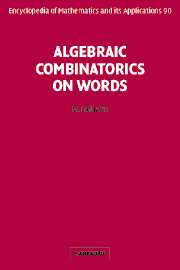Book contents
- Frontmatter
- Contents
- Preface
- Chapter 1 Finite and Infinite Words
- Chapter 2 Sturmian Words
- Chapter 3 Unavoidable Patterns
- Chapter 4 Sesquipowers
- Chapter 5 The Plactic Monoid
- Chapter 6 Codes
- Chapter 7 Numeration Systems
- Chapter 8 Periodicity
- Chapter 9 Centralizers of Noncommutative Series and Polynomials
- Chapter 10 Transformations on Words and q-Calculus
- Chapter 11 Statistics on Permutations and Words
- Chapter 12 Makanin's Algorithm
- Chapter 13 Independent Systems of Equations
- References
- Index of Notation
- General Index
Chapter 7 - Numeration Systems
Published online by Cambridge University Press: 05 April 2013
- Frontmatter
- Contents
- Preface
- Chapter 1 Finite and Infinite Words
- Chapter 2 Sturmian Words
- Chapter 3 Unavoidable Patterns
- Chapter 4 Sesquipowers
- Chapter 5 The Plactic Monoid
- Chapter 6 Codes
- Chapter 7 Numeration Systems
- Chapter 8 Periodicity
- Chapter 9 Centralizers of Noncommutative Series and Polynomials
- Chapter 10 Transformations on Words and q-Calculus
- Chapter 11 Statistics on Permutations and Words
- Chapter 12 Makanin's Algorithm
- Chapter 13 Independent Systems of Equations
- References
- Index of Notation
- General Index
Summary
Introduction
This chapter deals with positional numeration systems. Numbers are seen as finite or infinite words over an alphabet of digits. A numeration system is defined by a pair composed of a base or a sequence of numbers, and of an alphabet of digits. In this chapter we study the representation of natural numbers, of real numbers and of complex numbers. We will present several generalizations of the usual notion of numeration system, which lead to interesting problems.
Properties of words representing numbers are well studied in number theory: the concepts of period, digit frequency, normality give rise to important results. Cantor sets can be defined by digital expansions.
In computer arithmetic, it is recognized that algorithmic possibilities depend on the representation of numbers. For instance, addition of two integers represented in the usual binary system, with digits 0 and 1, takes a time proportional to the size of the data. But if these numbers are represented with signed digits 0, 1, and —1, then addition can be realized in parallel in a time independent of the size of the data.
Since numbers are words, finite state automata are relevant tools to describe sets of number representations, and also to characterize the complexity of arithmetic operations. For instance, addition in the usual binary system is a function computable by a finite automaton, but multiplication is not.
- Type
- Chapter
- Information
- Algebraic Combinatorics on Words , pp. 230 - 268Publisher: Cambridge University PressPrint publication year: 2002
- 2
- Cited by



